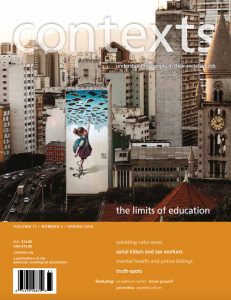
Spring 2018
Volume: 17 | Number: 2
Resist, or What?
Exploring a time of contentious political engagement, from individual actions to the social, regional, and topical movements taking form online, in the halls of government, and out in the streets Read More
Education’s Limitations and Its Radical Possibilities
Public education aims to grow generations of literate, critical, creative, and civically engaged students who edify and build a living democracy. Somewhere, that purpose has faltered. Read More
Letter from the Editors: Spring 2018
Education is a central feature of our lives. Collectively, our society invests billions of dollars in schools and colleges, with the hope that they … Read More
Table of Contents, Spring 2018
Click here to view all content currently available at contexts.org. Click here to view the entire issue online at SAGE, with the full … Read More
